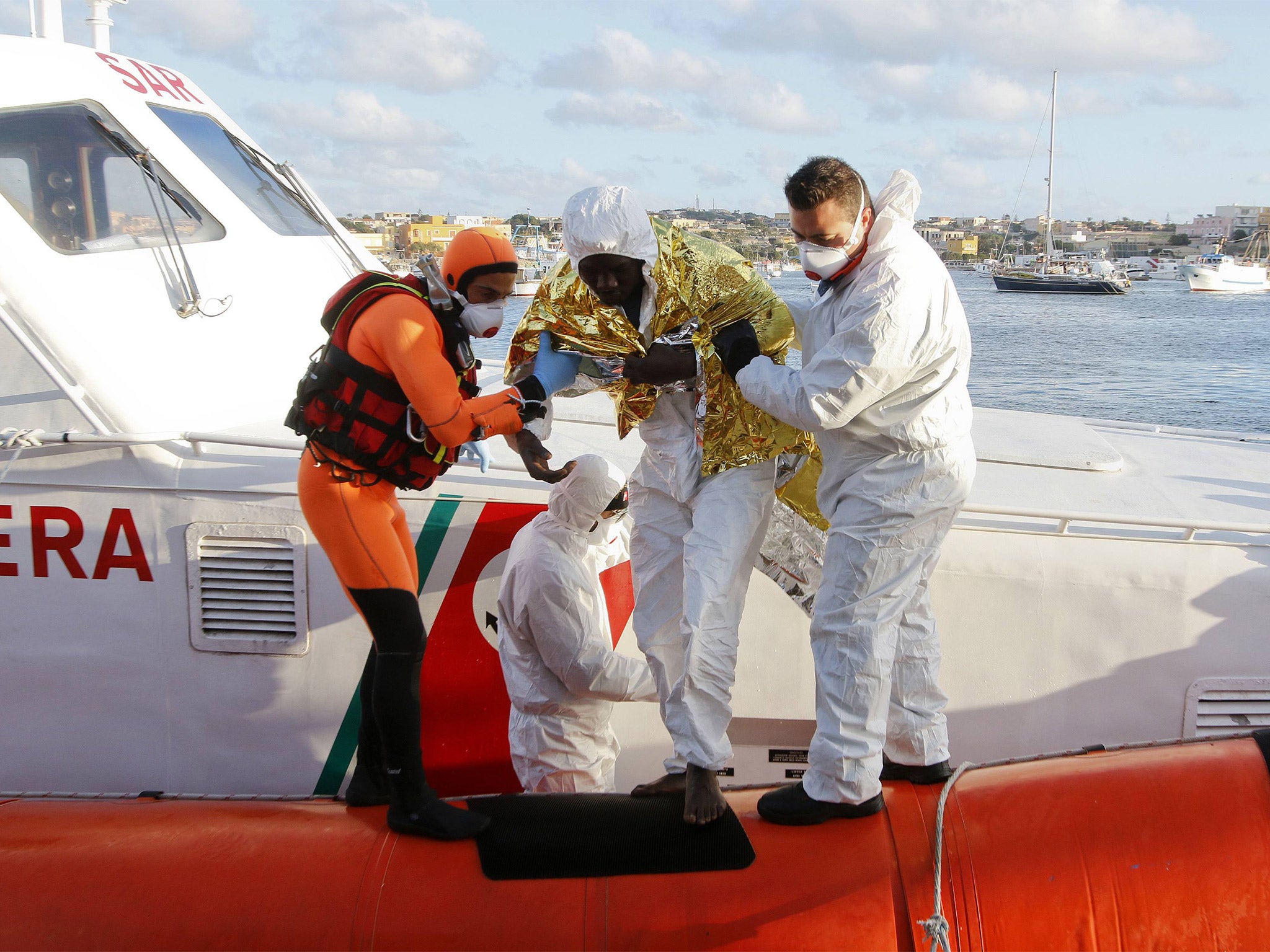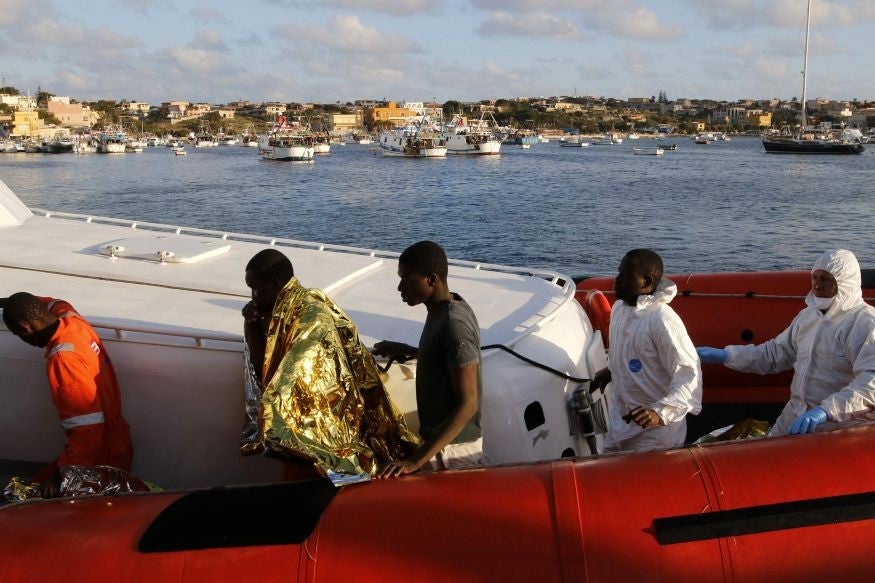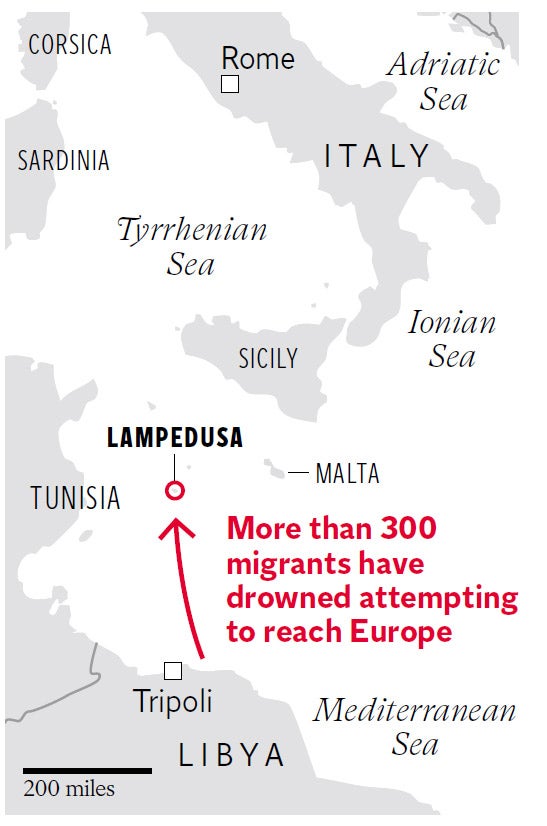Hundreds of migrants feared dead in latest Mediterranean tragedy: 'They were swallowed by the waves'
UN body criticises EU's Triton mission, as politicians and campaigners call for Italy to take action by reinstating its navy-run aid operation

More than 300 migrants were said to have died making the treacherous journey across the Mediterranean Sea from North Africa in recent days, sparking calls for European authorities to plough more resources into search and rescue operations – or for the return of an Italian-run programme ended last year – to halt the mass loss of lives.
After news that 29 migrants froze to death on Sunday night between North Africa and Sicily, the International Maritime Organisation said today that three other inflatable boats carrying around 100 people each had sunk and the total death toll was “at least 330”.
Reports suggest that one of the boats capsized, another then partially tipped over as other refugees panicked.
News of the tragedy – one of the worst single incidents in the ongoing migrant crisis – drew lacerating criticism from human rights groups, which demanded the immediate re-instatement of the Italian navy’s Mare Nostrum mission, ended last year and replaced by a programme run by the EU boarder protection agency, Frontex.

“The EU and its member states must hang their heads in shame,” said John Dalhuisen, Europe Programme Director at Amnesty International. “This new tragedy realises our worst fears about the end of Italy’s Mare Nostrum search and rescue operation and exposes the predictable consequences of the European Union’s failure to provide an adequate replacement.”
The Italian Coast Guard said the dinghies, which set off from Libya, were drifting in extreme sea conditions with waves as high as eight metres and temperatures barely above zero. Those who died were believed to be between 18 and 25 years old and from sub-Saharan Africa.

Despite rescuing a number of migrants, hundreds were “swallowed by the waves,” UN Refugee Agency (UNHCR), spokeswoman Carlotta Sami said. Two of the boats were part of a four-vessel flotilla that left a beach near Libya’s capital Tripoli on Saturday, according to Ms Sami. One of the vessels has yet to be found.
In December, the Mediterranean crossing from African to Europe was dubbed “the most lethal route in the world” by the UN agency for refugees, after announcing that a record 3,419 migrants had lost their lives in 2014 crossing the sea on rickety boats.
But according to the UN agency, the number of irregular migrants arriving by sea in January 2015 increased by around 60 per cent over the same month last year, when Mare Nostrum was in place.
Laurens Jolles, UNHCR Executive Officer for Southern Europe, said it was “astonishing” that the EU had not built on the success of Mare Nostrum, given the “magnitude of the humanitarian crisis in progress”.
Michael Diedring, Secretary General of the European Council on Refugees and Exiles said: “It’s a question of life or death and the EU needs to engage now to save lives”.
As the gravity of the latest incident began to sink in, Federica Mogherini, the EU’s foreign affairs chief and a former Italian foreign minister, announced she was calling for an “emergency meeting” on migrant deaths.
The Italian coalition government, of which Ms Mogherini was a member until October 2014, succumbed to right wing pressure to phase out the Mare Nostrum at the end of the last year, claiming that the migrant crisis was the responsibility of the whole continent. It was replaced by the Triton system, run by Frontex – launched with resources of just €3m a month, a third of what the Italian navy had at it disposal. Natasha Bertaud, a spokesperson for the European Commission, said that in the aftermath of a tragedy, “pointing fingers is not going to get us anywhere”. But she conceded that Frontex was not up to the task of preventing carnage in the Mediterranean.
Mare Nostrum was set up by the former Italian Prime Minister, Enrico Letta, after two migrant disasters in October 2013. In the worst accident, a boat capsized off the Sicilian island of Lampedusa, killing more than 360 people. The Government said it saved over 100,000 lives at sea. Mr Letta called today for it to be brought back.
Giusi Nicolini, the mayor of Lampedusa, said: “The 366 deaths at Lampedusa counted for nothing. The words of the Pope counted for nothing. We are going back to where we were before Mare Nostrum.”
Ms Nicolini said she would seek to meet the Interior Minister, Angelino Alfano, “as soon as possible” in order to pressure the government to overhaul rescue services before the spring.
Many experts fear the arrival of warmer weather will bring with it a deadly new surge in numbers fleeing North Africa and the Middle East.
Mare Nostrum deployed five ships including two frigates with helicopter landing pads, an amphibious ship with a crew of 180, and two patrol vessels, as well as helicopters, drones and other coast guard air assets. Triton operates with seven smaller patrol boats, one helicopter and four fixed wing aircraft. Crucially, the boundaries of Triton’s operating area are limited to 30 nautical miles from the Italian coast, whereas Mare Nostrum ventured much further out to sea.
Paolo Gentiloni, Italy’s current foreign minister, said: “Triton is a start but it’s not sufficient and the scope of the initiative are reduced compared to Mare Nostrum”.
Martin Xuereb, director of the rescue charity Migrant Offshore Aid Station, said: “Migrants are being pushed to leave their homes, not pulled to Europe. They are getting onto boats in rough seas and freezing weather, knowing the rescue missions have stopped. This is their last resort.”
Join our commenting forum
Join thought-provoking conversations, follow other Independent readers and see their replies
Comments